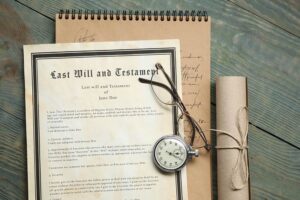What is a Will?
A will, formally known as a Last Will and Testament, is a legal document that allows an individual to specify how their estate should be managed and distributed after their death. By creating a will, the individual, known as the testator, can outline clear directives for asset distribution, appoint key individuals to carry out their wishes, and help mitigate potential conflicts among loved ones. Without a will, property is distributed in accordance with North Carolina’s intestacy laws, which may not align with the testator’s preferences.
What Can a Will Do?
A will serves as a legally binding document that provides critical instructions for managing and distributing an individual’s estate. In addition to outlining asset distribution, a will can include special directives, such as:
- Final Arrangements: Specify burial or cremation preferences to ensure loved ones are aware of and can honor these wishes.
- Executor Appointment: Name a trusted individual (executor or executrix) to manage and execute the terms of the will.
- Asset Distribution: Provide clear directives for distributing assets to beneficiaries, heirs, or charitable organizations, including items of sentimental value.
- Care for Minor Children: Designate a guardian to manage the physical and financial needs of minor children according to the testator’s preferences.
- Testamentary Trusts: Establish trusts to manage assets for beneficiaries who may be young, financially inexperienced, or disabled, ensuring structured financial support.
Types of Wills in North Carolina
North Carolina recognizes various types of wills, each suited to different circumstances. These are generally categorized into attested wills and unattested wills.
Attested Wills
An attested will is signed by the testator and witnessed by two competent individuals. These wills are the most common and reliable type of will used in North Carolina.
Key Requirements:
- The will must be in writing.
- The testator must voluntarily sign the will, free of duress or coercion.
- Two competent witnesses must either see the testator sign the will or hear the testator acknowledge their signature.
Self-Proving Wills
Attested wills can also be made self-proving to simplify the probate process. This is achieved through notarized signatures of the testator and witnesses or through affidavits. A self-proving will eliminates the need to locate witnesses later to validate the will.
Unattested Wills
Unattested wills are legally valid in North Carolina under specific circumstances and include the following types:
- Holographic Wills: Entirely handwritten by the testator and not witnessed.
- Must include the testator’s name as a signature or within the document.
- Must be found among the testator’s personal belongings or in the care of a trusted individual after their death.
- Nuncupative Wills: Spoken wills created by individuals who are gravely ill or near death.
- Must be declared in the presence of at least two competent witnesses at the testator’s request.
- Only valid if the testator passes away during the period of peril; otherwise, the will is void.
Joint Wills
A joint will is a single will created by two individuals, typically spouses, to address the distribution of both estates. While they may simplify initial estate planning, joint wills often present significant drawbacks:
- They become irrevocable after one spouse’s death, limiting the surviving spouse’s ability to make changes.
- They can complicate the probate process, making it difficult to administer estates separately.
For these reasons, separate wills are generally recommended to provide greater flexibility and ease of administration.
Why Work with an Estate Planning Attorney?
Trusts and wills are not one-size-fits-all solutions. Whether you’re creating a simple will or addressing more complex estate planning needs, working with an experienced estate planning attorney ensures your wishes are clearly stated and legally enforceable. An attorney can also help you navigate the nuances of North Carolina estate laws, identify opportunities to protect your assets, and mitigate potential disputes.
How Crosswhite Law Can Help
At Crosswhite Law, our estate planning attorneys have extensive experience serving individuals and families throughout Iredell, Rowan, Davie, Catawba, and Alexander counties. From creating simple wills to addressing complex estate planning needs, we are committed to providing personalized solutions that reflect your unique goals and ensure your wishes are carried out efficiently and effectively.
If you need to create a will, review an existing one, or develop a comprehensive estate plan, contact us today. Our skilled attorneys will guide you through the process and help you make informed decisions to secure your legacy.
📞 To schedule a confidential consultation, call (704) 445-3085 or complete our online form.


